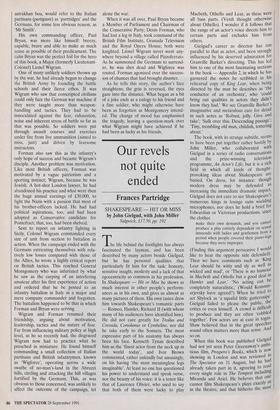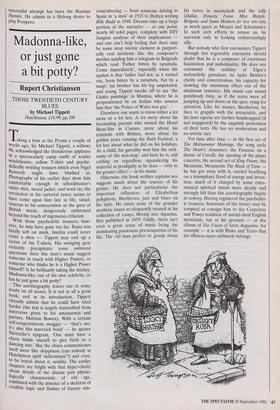Our revels not quite ended
Frances Partridge
SHAKESPEARE — HIT OR MISS by John Gielgud, with John Miller Sidgwick, £17.50, pp. 192 The life behind the footlights has always fascinated the layman, and has been described by many actors beside Gielgud, but he has personal qualities that particularly fit him for the task: honesty, sensitive insight, modesty and a lack of that egocentricity so common in his profession. In Shakespeare — Hit or Miss he shows as much interest in other people's perform- ances as in his own, and gives us almost as many pictures of them. His own tastes drew him towards Shakespeare's romantic parts — Romeo, Hamlet, Richard II (with whom many of his audiences have identified him). He did not care greatly for Troilus and Cressida, Coriolanus or Cymbeline, nor did he take early to the Sonnets. The most expressive part of his anatomy has always been his face. Kenneth Tynan described him as the 'finest actor from the neck up in the world today', and Ivor Brown commented, rather unkindly but amusingly, on his having 'the most meaningless legs imaginable'. At least no one has questioned his power to understand and speak verse, nor the beauty of his voice: it is a tenor like that of Laurence Olivier, who used to say that both of them were lucky to play
Macbeth, Othello and Lear, as these were all bass parts. (Verdi thought otherwise about Othello). I wonder if it follows that the range of an actor's voice directs him to certain parts and excludes him from others.
Gielgud's career as director has run parallel to that as actor, and been strongly influenced by his deserved admiration for Granville Barker's directing. This has led him to one of the most fascinating sections in the book — Appendix 2, in which he has garnered the notes he scribbled in his rehearsal copy of King Lear, when being directed by the man he describes as 'the conductor of an orchestra', who 'could bring out qualities in actors they didn't know they had.' We see Granville Barker's imaginative and meticulous care for detail in such notes as 'Robust, jolly. Give and take'; 'Sulk over this. Descending passage'; `Tiny, trembling old man, childish, tottering about.'
The book, with its strange subtitle, seems to have been put together rather hastily by John Miller, who collaborated with Gielgud in a series of radio conversations
and the prize-winning television programme, An Actor's Life; but it is a rich field in which all kinds of thought- provoking ideas about Shakespeare are buried. On dress, for instance: though modern dress may be defended as increasing the immediate dramatic impact, Gielgud does not care to see Shakespeare's numerous kings in lounge suits wielding microphones, nor does he hold a brief for Edwardian or Victorian productions, since the clothes
make their own demands, and you cannot produce a play entirely dependent on sexual innuendo with ladies and gentlemen from a period when people covered their piano-legs because they were improper.
(Finding this argument persuasive I would like to hear the opposite side defended). Then we have comments such as 'King Lear should be witty and sly as well as wicked and mad', or 'There is no humour in Macbeth and Othello but a good deal in Hamlet and Lear,' No acting can be completely naturalistic,' (Would Kommis- arjevsky have agreed?) When he tried to, act Shylock as 'a squalid little guttersnipe' Gielgud failed to please the public, the critics or even himself. A crowd is difficult to produce and they are often 'cobbled together'. Few actors are at ease in togas. Shaw believed that in the great speeches sound often matters more than sense. And so on. When this book was published Gielgud had not yet seen Peter Greenaway's ambi- tious film, Prospero's Books, which is now showing in London and was reviewed in The Spectator on 31 August, but he had already taken part in it, agreeing to read every single role in The Tempest including Miranda and Ariel. He believes that one cannot film Shakespeare's plays exactly as in the theatre, and that hitherto the most
successful attempt has been the Russian Hamlet. He admits to a lifelong desire to play Prospero.



































































 Previous page
Previous page